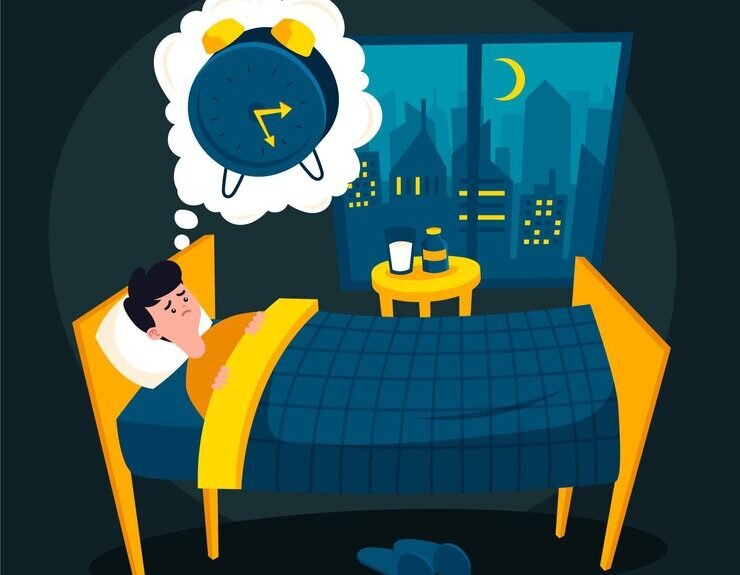Why Is It Important To Sleep At Night Than Day?
Have you ever wondered why we often feel more energized and alert after a good night’s sleep? Or why sleeping during the day can leave us groggy and disoriented? As humans, our bodies are intricately designed to follow a natural rhythm, dictated by our internal biological clock, known as circadian rhythms. These rhythms dictate not only when we feel sleepy, but also influence our overall health and well-being.
It is impossible to overestimate the significance of getting enough good sleep in our rapid environment. Nighttime sleep offers unique benefits that daytime slumber simply cannot replicate. Research shows that sleep at night than day improves mental health, enhances physical health, and leads to better sleep quality. However, many people overlook the significance of aligning their sleep patterns with nature’s cycle, often opting for daytime naps or irregular sleep schedules.
In this blog, we will explore the compelling reasons why it is crucial to prioritize sleep at night than day. We’ll delve into the numerous benefits of sleeping at night, the consequences of disrupting our natural sleep cycle, and practical strategies for improving your nighttime rest. By understanding the value of a good night’s sleep, you can enhance your productivity, boost your mood, and ultimately lead a healthier life. So, let’s uncover the secrets behind the benefits of night sleep and discover how to harness them for our well-being!
ALSO READ: Sleep Deprivation: Unlock the Hidden Dangers and Transform Your Health with Better Rest
I. The Importance of Sleep
When was the last time you paused to think about the significance of sleep? It’s a fundamental part of our lives, yet we often take it for granted. Sleep is not merely a period of rest; it plays a crucial role in our overall health and well-being. In fact, understanding the importance of sleep at night than day can lead to transformative changes in our daily lives. So, let’s dive deeper into why sleep is essential and how it impacts our physical and mental health.
A. Overview of Sleep’s Role in Health

At its core, sleep is vital for rejuvenating both the body and mind. During sleep, our bodies engage in numerous processes that are critical for optimal functioning. These include:
- Cell Repair: While we sleep, our body works to repair muscles, tissues, and cells, promoting overall recovery.
- Memory Consolidation: Sleep plays a key role in processing and storing memories. Have you ever observed that a restful night’s sleep makes your thinking significantly clearer? This is why!
- Immune Function: Adequate sleep strengthens our immune system, making us less susceptible to illness.
Failing to prioritize sleep can disrupt these essential processes, leading to fatigue, mood swings, and decreased productivity.
B. Biological Clock and Circadian Rhythms

Our bodies are designed to follow a natural rhythm; this is where circadian rhythms come into play. These internal clocks help regulate sleep-wake cycles, influencing everything from hormone release to body temperature. It’s fascinating to consider how much our health is tied to this natural timing!
When we sleep at night than day, we align ourselves with our biological clock. This synchronization not only enhances the quality of our sleep but also maximizes the benefits derived from it. Research shows that sleeping at night rather than during the day can lead to better cognitive performance and physical recovery. If you’ve ever found yourself struggling to stay awake during a night shift or feeling sluggish after a day of irregular sleeping, you know how essential this alignment is.
C. Day vs. Night Sleep: What’s the Difference?

You might be asking, “Isn’t sleep just sleep?” Any sleep can provide rest, but the benefits and quality of our sleep are significantly affected by the time of day we choose to sleep. Here’s how night sleep differs from day sleep:
- Melatonin Production: At night, our bodies produce melatonin, the hormone that regulates sleep. Daytime sleep can be challenging because melatonin levels are lower, leading to less restorative sleep.
- Sleep Stages: Night sleep allows for a full progression through the various sleep stages light sleep, deep sleep, and REM sleep—each of which plays a crucial role in our recovery and cognitive function.
- Environmental Factors: The natural darkness at night encourages better sleep conditions. Daytime sleep often faces interruptions from light, noise, and daily activities, making it less restorative.
So, as you can see, the time of day you choose to sleep can significantly impact your health. Recognizing the importance of sleep at night than day is the first step towards improving your sleep quality and overall well-being.
By prioritizing night sleep, you set the stage for a healthier lifestyle, improved mood, and increased productivity. Understanding these differences empowers you to make informed choices about your sleep habits, ultimately leading to a more energized and vibrant life. Are you ready to embrace the power of a good night’s sleep?
II. Benefits of Night Sleep
Have you ever woken up feeling like you’ve just conquered the world? That sense of refreshment and clarity often comes from a full night’s sleep. But what exactly makes nighttime sleep so special? Research shows that people who prioritize sleep at night than day tend to experience better cognitive function and emotional well-being. Let’s dive into the remarkable benefits that come with prioritizing sleep at night, illuminating how it can enhance every aspect of your life.
A. Improved Mental Health

One of the most profound benefits of sleeping at night is its impact on mental health. Have you noticed how a lack of sleep can make you feel irritable or overwhelmed?
- Stress Reduction: Quality night sleep lowers cortisol levels, the stress hormone, helping you feel more relaxed and in control.
- Emotional Resilience: A good night’s sleep enhances your ability to cope with challenges, making you less susceptible to anxiety and depression.
- Enhanced Cognitive Function: Sleep is crucial for memory consolidation and creativity. A well-rested brain is more adept at problem-solving and thinking critically.
B. Enhanced Physical Health

Night sleep is also a powerful ally for your physical health. By sleeping at night, you support essential bodily functions that are crucial for maintaining overall wellness.
- Hormonal Balance: Sleep regulates hormones that control appetite, metabolism, and stress, contributing to better weight management and reduced cravings.
- Heart Health: Studies show that quality night sleep lowers the risk of heart disease and high blood pressure. Prioritizing night sleep can be a simple yet effective way to safeguard your heart.
- Immune Function: While you sleep, your immune system ramps up production of cytokines, proteins that fight infection and inflammation. This is why good sleep can keep you healthier overall.
C. Better Sleep Quality at Night

Have you ever experienced those restless nights where you toss and turn? When you prioritize sleep at night, you increase your chances of enjoying deeper, more restorative sleep cycles.
- Melatonin Production: Night sleep coincides with higher melatonin levels, promoting deeper sleep and better recovery.
- Reduced Disruptions: Nighttime sleep tends to have fewer interruptions from light and noise, allowing for uninterrupted cycles that are essential for restorative rest.
D. Higher Productivity During Daytime

Imagine waking up invigorated, ready to take on your to-do list. The productivity benefits of night sleep are impressive and often life-changing.
- Increased Focus: A well-rested mind is sharper and more alert, enhancing your ability to concentrate on tasks.
- Better Decision-Making: Quality sleep improves judgment and decision-making skills, leading to more effective work performance.
- Enhanced Creativity: Night sleep boosts creative thinking, enabling you to approach problems from innovative angles.
In conclusion, the benefits of prioritizing night sleep extend far beyond simply feeling rested. From improved mental health to enhanced physical well-being, sleep at night than day can revolutionize your life. So, are you ready to embrace these advantages and make the most of your nights? Your journey toward better sleep starts now!
III. Consequences of Sleeping During the Day
While some people may think that any sleep is good sleep, have you ever considered the potential drawbacks of sleeping during the day? It’s essential to understand how disrupting our natural sleep cycle can affect our health and well-being. Studies show that people who prioritize sleep at night than day experience better overall health outcomes. Let’s explore the consequences of sleeping during the day and why night sleep is crucial for maintaining a balanced lifestyle.
A. Disruption of Circadian Rhythms
.jpg)
Our bodies thrive on routines, and circadian rhythms play a significant role in regulating our sleep-wake cycles. When we opt for daytime sleep, we can disrupt these natural rhythms, leading to several negative effects.
- Inconsistent Sleep Patterns: Daytime sleeping can create irregular sleep schedules, making it harder to maintain a healthy rhythm.
- Difficulty Falling Asleep at Night: If you frequently sleep during the day, you may find it challenging to fall asleep when night comes, leading to a cycle of poor sleep quality.
B. Impacts on Mental and Emotional Well-being

Have you noticed how you feel after a day of erratic sleeping habits? Sleeping during the day can take a toll on your mental and emotional health.
- Increased Fatigue: Daytime sleep often lacks the depth of night sleep, resulting in feelings of grogginess and fatigue.
- Mood Swings: Disrupted sleep can lead to irritability and mood swings, affecting your interactions with others and overall quality of life.
C. Risks of Sleep Disorders

Continuously sleeping during the day can heighten the risk of developing sleep disorders, further complicating your health.
- Insomnia: Habitual daytime sleeping can lead to difficulties falling asleep or staying asleep at night, resulting in insomnia.
- Sleep Apnea: Altered sleep patterns may increase the likelihood of sleep apnea, a condition that disrupts sleep and causes various health issues.
D. Long-term Health Implications

The long-term consequences of sleeping during the day can be significant and warrant serious consideration.
- Chronic Fatigue: Over time, poor sleep quality can lead to chronic fatigue, affecting every aspect of your life.
- Increased Risk of Health Issues: Studies have shown that individuals who regularly sleep during the day may be at a higher risk for conditions such as obesity, diabetes, and cardiovascular disease.
Recognizing the consequences of daytime sleep is vital for making informed choices about your rest. By prioritizing night sleep, you not only support your circadian rhythms but also safeguard your mental and physical health. Are you ready to embrace the benefits of a good night’s sleep and minimize the risks of sleeping during the day?
Recognizing the consequences of daytime sleep is vital for making informed choices about your rest. By prioritizing night sleep, you not only support your circadian rhythms but also safeguard your mental and physical health. Research consistently shows that people who sleep at night than day experience better overall health outcomes. Are you ready to embrace the benefits of a good night’s sleep and minimize the risks of sleeping during the day?
IV. Strategies for Better Night Sleep
Now that we’ve explored the importance of night sleep, the benefits it offers, and the risks associated with daytime sleeping, let’s discuss practical strategies to help you achieve better sleep at night. Making small adjustments can lead to significant improvements in your sleep quality and overall well-being.
Now that we’ve explored the importance of night sleep, the benefits it offers, and the risks associated with daytime sleeping, let’s discuss practical strategies to help you achieve better sleep at night. Prioritizing sleep at night than day is one of the most effective changes you can make for better sleep quality. Making small adjustments can lead to significant improvements in your sleep quality and overall well-being.
A. Creating a Sleep-Friendly Environment

Your sleep environment plays a crucial role in how well you rest. Consider these tips to create a sanctuary for sleep:
- Keep it Dark: Use blackout curtains or an eye mask to block out light, signaling your body that it’s time to wind down.
- Maintain a Comfortable Temperature: Aim for a cool, comfortable sleeping environment. The ideal temperature for sleep is generally around 60-67°F (15-19°C).
- Limit Noise: Consider using white noise machines or earplugs to minimize disruptions from external sounds.
B. Establishing a Consistent Sleep Schedule

Have you ever noticed how irregular sleep patterns can leave you feeling out of sync? A consistent sleep schedule can help regulate your body’s internal clock.
- Set a Bedtime and Wake Time: Try to go to bed and wake up at the same time each day, even on weekends. This consistency reinforces your body’s natural rhythms.
- Avoid Long Naps: If you need to nap, limit it to 20-30 minutes and avoid napping late in the day to prevent interference with nighttime sleep.
C. Limiting Daytime Naps

While napping can be beneficial, excessive or poorly timed naps can disrupt your nighttime sleep quality. Here are some tips:
- Be Mindful of Timing: If you must nap, do so earlier in the day to avoid impacting your ability to fall asleep at night.
- Keep Naps Short: Aim for a quick power nap to recharge without compromising your nighttime rest.
D. Importance of Wind-Down Routines

Creating a relaxing pre-sleep routine can signal to your body that it’s time to prepare for rest. Consider these strategies:
- Limit Screen Time: Reduce exposure to screens at least an hour before bedtime. The blue light emitted by devices can interfere with melatonin production.
- Practice Relaxation Techniques: Engage in calming activities such as reading, gentle yoga, or meditation to help your mind and body transition into sleep mode.
By implementing these strategies, you can significantly enhance your ability to fall asleep and enjoy a restorative night’s rest. Choosing to sleep at night than day is one of the most impactful steps you can take toward improving your sleep quality. Prioritizing night sleep is not just a choice; it’s an investment in your health and happiness. Are you ready to make these changes and reap the rewards of a good night’s sleep? Your journey to better sleep starts here!
Final Thoughts
As we wrap up our exploration of why it’s important to sleep at night than day, let’s take a moment to reflect on the insights we’ve gained. The significance of sleep in our lives cannot be overstated; it is the foundation upon which our physical health, mental clarity, and emotional resilience are built.
Have you considered how prioritizing sleep at night than day can transform your daily life? Imagine waking up refreshed, your mind sharp and your body recharged, ready to tackle the challenges of the day. By aligning your sleep with your biological clock, you not only enhance the quality of your rest but also maximize the myriad benefits that come with it, from improved memory to a stronger immune system.
If you’ve been struggling with daytime fatigue or disrupted sleep cycles, it’s time to make a change. Start by creating a nighttime routine that signals your body it’s time to wind down. Limit screen time, create a calming environment, and stick to a consistent sleep schedule. These small adjustments can lead to profound improvements in your overall well-being.
Ultimately, embracing the importance of sleep at night than day can pave the way for a healthier, more vibrant life. So, why wait? Take the first step towards better sleep today, and you may just discover a renewed sense of energy and purpose in everything you do.
Remember, the journey to better sleep is not just about quantity but quality. Let’s commit to prioritizing our nighttime rest and reaping the countless benefits it offers. Are you ready to experience the power of a good night’s sleep? The choice is yours!
Love what you read? Join our community! Like, share, and follow Wikifomo for more exciting insights. Your support encourages our passion! Thank You.
FAQ
1. Why is sleeping at night better than sleeping during the day?
Sleeping at night aligns with our natural circadian rhythms, leading to improved sleep quality, better hormonal balance, and more restorative sleep stages. Nighttime sleep also coincides with higher melatonin production, enhancing overall health and well-being.
2. What are circadian rhythms?
Circadian rhythms are natural, internal processes that regulate the sleep-wake cycle and other physiological functions. These rhythms respond to environmental cues like light and darkness, helping to dictate when we feel awake or sleepy.
3. What are the benefits of prioritizing nighttime sleep?
Prioritizing nighttime sleep can improve mental health by reducing stress and enhancing emotional resilience, boost physical health by supporting immune function and heart health, and increase productivity and cognitive function during the day.
4. How does daytime sleeping affect mental health?
Sleeping during the day can disrupt natural sleep cycles, leading to increased fatigue, irritability, and mood swings. It may also increase the risk of anxiety and depression due to inconsistent sleep patterns.
5. Can I catch up on sleep during the weekends?
While sleeping in on weekends can help alleviate sleep debt, it’s not a substitute for consistent nightly sleep. Irregular sleep patterns can further disrupt your circadian rhythms, making it harder to maintain a healthy sleep schedule.
6. What are some strategies to improve nighttime sleep quality?
To enhance nighttime sleep quality, create a sleep-friendly environment (dark, quiet, and cool), establish a consistent sleep schedule, limit screen time before bed, and engage in relaxing pre-sleep routines such as reading or meditation.



